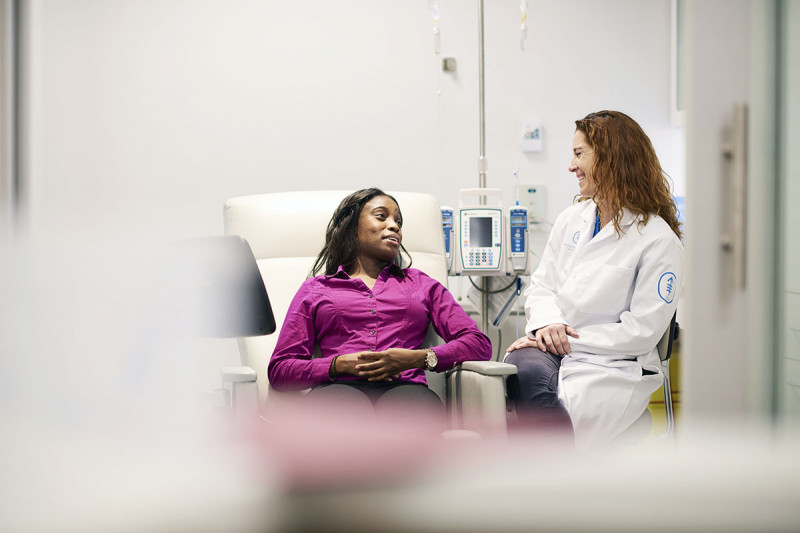
Chemotherapy has been a mainstay of cancer treatment since the 1940s, and it is still evolving to this day. For people with breast cancer, treatment innovations take place regularly. Tiffany Traina, Clinical Director of the Breast Medicine Service and Section Head of the Triple-Negative Breast Cancer Clinical Research Program at Memorial Sloan Kettering, details some exciting improvements.
1. Determining Who Really Needs Chemo
For women with early-stage breast cancer, some of the most recent breakthroughs are genomic tests that look at how the genes in a tumor are expressed to predict if chemotherapy is likely to be of benefit. “This has dramatically changed our ability to refine who needs chemotherapy,” says Dr. Traina. These tests help doctors make precise and encouraging recommendations: The majority of women with an estrogen-driven cancer and negative lymph nodes who are over 50 years old, and some women under 50, will not need chemotherapy. “It’s been a great tool for us and for patients,” says Dr. Traina.
2. A New Approach to Treatment
Treatment for breast cancer often involves surgery followed by chemotherapy. But some women with early-stage disease for certain types of cancer, such as triple negative or HER2 positive, may have chemotherapy before surgery. How they respond may help doctors determine what treatment they’ll need after surgery. For example, women with early-stage HER2-positive breast cancer whose tumors did not disappear after preoperative chemotherapy and targeted therapy might then receive a different HER2-targeted therapy after surgery.
3. Promising Drug for Cancer That Has Spread
The need for improved therapies for people with cancer that has spread to another part of the body (metastatic disease) is urgent. There is now an option for women with hormone-driven breast cancer that has a PIK3CA mutation. Doctors can find out which tumors have this mutation using a test called MSK-IMPACT™, which looks for mutations in cancer-causing genes. “Based on a tumor’s profile, we can add other treatments to standard antiestrogen therapy that will successfully target important cancer pathways,” says Dr. Traina. This combination extends the benefit of hormonal therapy and improves progression-free survival, which is the amount of time during and after treatment that cancer does not get worse.
4. Immunotherapy and Chemotherapy for Metastatic Triple-Negative Breast Cancer
The US Food and Drug Administration has approved an immunotherapy drug for triple-negative breast cancer, a very rare form of the disease. Atezolizumab (Tecentriq®) works in tumors with immune cells that test positive for a protein called PD-L1; about 40 percent of triple-negative breast cancers have this characteristic. Combined with chemotherapy, the drug improves progression-free survival. As researchers continue to study this drug and others like it, they are asking if it improves overall survival (the time a person is alive after diagnosis) and if it may have a benefit in early-stage triple-negative breast cancer as well.
5. Engineered Medicines
Drugs that attach to cancer-directed antibodies can help fight triple-negative and HER2-positive breast cancer. These drugs allow doctors to deliver small doses of highly active chemotherapy directly to cancer cells. They are showing great promise for cancers that have resisted other therapies. “Antibody drug conjugates are showing really powerful responses and encouraging benefit in breast-cancer-related survival,” says Dr. Traina.
6. Shorter Breaks between Chemotherapy
Work pioneered years ago by Larry Norton, Medical Director of MSK’s Evelyn H. Lauder Breast Center, has shown that women who have less time between their chemotherapy sessions have fewer recurrences of breast cancer and live longer. The thinking goes that the less time between treatments, the less time the cancer has to regrow. There’s no need to change the amount of chemotherapy given — just the schedule it’s given on.





